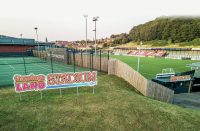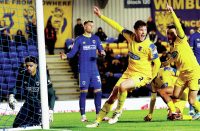SPECTATOR SPORT: A clash between Long Melford and Thetford bears many of the hallmarks that I love about Non-League football. Picture: David Bauckham
The word I keep hearing is reset. This crisis, many say, is giving the planet, the whole social and political system, and even us as individuals a chance to reset. That is to say, a chance to heal, slow down and reassess our priorities.
Maybe so. Maybe we will come out of it a nation of choristers, poets, and banana bread makers, kinder and more mindful. One thing’s for sure, though, personally. I’m going to come out of it an even bigger Non-League fan, desperate for Saturday at 3pm when I can get my fix, even if in socially-distanced solitude. Though come to think of it, not much change there.
I don’t want, or expect, to come back to Non-League the way it finished, however. As experienced minds such as Paul Doswell and Geoff Chapple have been noting in these pages in recent weeks, if this is not the time for the game to rethink and reinvent itself, put its foot on the ball and survey the state of play – yes, to reset – then when is?
In my opinion, in the last 20 years or so, Non-League has lost sight of what it is, what it should be, and what it is for.
Certainly at its National League upper echelons, it has become simply a wannabe Football League, full of clubs still angry that they were relegated and overspending in their desperation to return, frequently not matching it with expertise in hiring those who know how to spend it well.
The knock-on effect is a series of smaller clubs going full-time, even in North and South, to try and keep up.
Yes, I know the National League has financial regulations in place, that owners have to give financial guarantees at the start of a season, but it’s not stopping huge losses and boom and bust, is it?
And for what? Often watching humpy, lumpy football in stadiums with enormous overheads. I confess, while I enjoy some football at Step 2, Step 1 often leaves me cold with its too-frequent formula of physical specimens heading and kicking it away or launching it into channels to chase, maybe to win a set- piece and bundle a goal.
Again, there is knock-on. Those who aspire to Step 1 seem to see that too as a recipe for success; even some at Step 3 who are overstretching themselves off the field while serving up depressing fare on the field. Trust me, I’ve watched of lot of matches at all levels in recent seasons since stepping away from being involved in the game.
And while I’m at it, please let’s not pretend Non-League is an honest breath of fresh air compared to the Premier League. I’ve become fed up with diving and cheating, ‘game management’ of time-wasting, managers verbally pressurising and players surrounding referees, which is just not tolerated at the highest levels.
So Non-League, to my mind, needs to look at itself on and off the field. Short-term, it simply needs to survive amid restrictions imposed for its return, then look at the bigger picture for longer-term prosperity.
Off the field, with clubs now likely to be even more cash-strapped, the time has come for regionalisation and less travel costs, and more derbies to bring in revenue. And, ironically, that means a bigger Football League.
We need a League Two North and South that will take in two divisions of 21 clubs, which means 18 from the National League being promoted in one season.
After that, back to a Conference North and South. And, with it, an end to Gateshead v Torquay on a Tuesday night.
In the reorganisation, there should be four promotion places, two from each regional league, to the Football League.
With such a pathway, it makes it easier for the ambitious to progress and those relegated to return and thus takes away the desperation. The overspending. More clubs are going to have to go part-time, and this way, they would still have a chance of competing before going full-time should they succeed.
Which brings us to a long-overdue salary cap. The most successful at the highest level make player wages around 65 per cent of turnover and Non-League should adopt such a scheme. That doesn’t mean one sum fits all. It simply means the more a club can generate, through gate and sponsorship, the more it can pay players.
It shouldn’t stop investors either. Clubs can still attract them and put their money into the player wage pot. But there should be guarantees of investment and for periods of time. Too many clubs spend big on wages without ever improving infrastructure.
In the short-term, we are heading into the biggest recession in history, according to the Bank of England. It means that with supporters and sponsors likely to be tightening belts, clubs will need to be innovative.
This will mean ticket deals, contra-deals, partnerships with local businesses. Making often-underused grounds, with their potential for parking and social distancing, community hubs. Setting up pop-up shops, for example. And more online fund-raising, as has worked for national causes of late.
On the field, too, let’s see more entertaining and sporting attitudes. Let’s see wingers, less physical, more creative attitudes. You want people to come back? Give the players freedom to play and the protection of referees who don’t feel bullied. Let’s emphasise that this is an alternative; maybe not the proficiency of the Premier League but cheap and cheerful, honest and engaging. Managers and players need to be more real with wage demands, too.
Non-League’s charm to me has always been its closeness, both physically and emotionally. I like being able to – but not having to – arrive early to park up, enjoy the facilities and the food without long queues, to socialise. Even with players and management. Feel a part of it all. My town, my team.
Some of that will inevitably take time to return given measures likely to be in place for a while yet but Non-League is better placed to endure restrictions than higher up. It needs to be ready and willing to take advantage of its traditional strengths, and change its weaknesses.
I confess that my experience and opinions of leagues and their committees are not always flattering, which is why right now, the FA’s National Game administrators should take this time to canvass officials, managers and players – and perhaps set up a think tank – to see what changes for the better it can implement if we are to ride the crisis that many clubs are going to experience in the next six months.
For if nothing changes, we’re just going to end up like those people who pray on planes during turbulence, insisting they’ll be better people if they just get through this, then once on the ground elbow their way ignorantly through immigration.
I don’t know about you. I’d like back a mix of the Non-League I knew and loved and one that embraces modern realities.
























